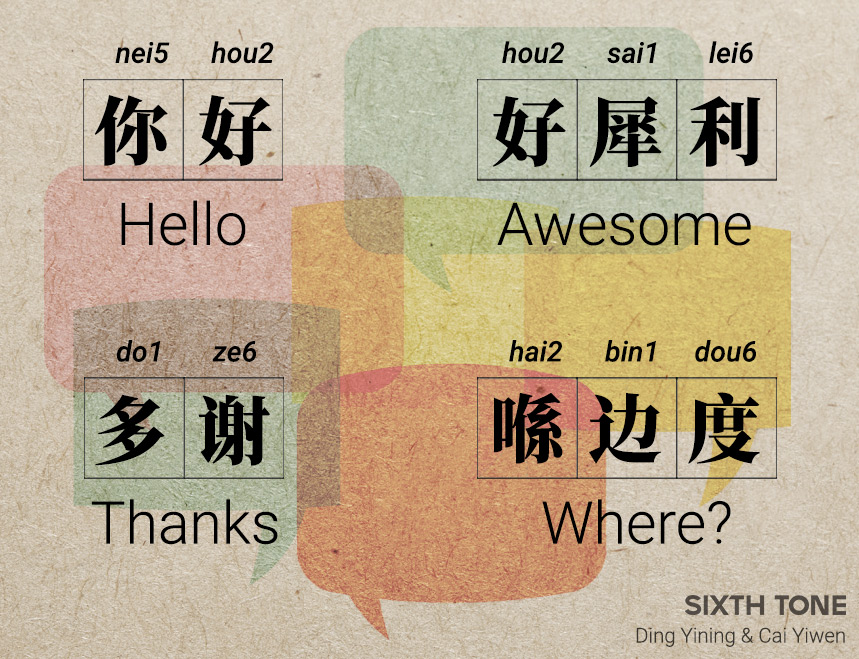Why I Speak Cantonese

Many folks that know me personally know how much time I dedicate each day towards becoming proficient at speaking, reading, and writing Cantonese, making it my favorite language and one I have developed a major personal goal of becoming proficient in. Cantonese, known as jyut6 jyuh5 (粵話), is one of the major languages of China and the Chinese diaspora abroad, spoken by around 100 million native speakers [1] today along the pearl river delta in the southern Chinese province of Gwongdung (廣東), Macao, Hong Kong, and Southeast Asia as a lingua franca. It is a language rich with tradition and a history spanning over 2000 years, retaining significant elements of Classical Chinese.
Both Cantonese and Mandarin use Chinese characters (中文字 zung1 man4 zi6) in their written form, allowing for a degree of correspondence between readers of the language. However, grammar, vocabulary, and sentence structures differ significantly between the two, and the spoken languages themselves are completely mutually unintelligible. Although both languages are tonal, meaning the pitch of how a word is pronounced determines its meaning, Cantonese has 6 very important tones (with certain words having one of 3 additional tones, bringing the total number up to 9) while Mandarin only uses 4. Both languages also have almost completely different phonologies in terms of initials, finals, and syllables in general. Mandarin as the predominant language in mainland China, uses simplified characters in day to day written form, while Cantonese is written in traditional characters in daily communications. For example:
Cantonese 你知唔知道佢哋喺邊度呀?leih5 zi1 m4 zi1 do1 keoi5 dei3 hai2 bin1 douh6 aa3? = Do you know where they are?
Mandarin 你知道他们在哪里嗎?ni zhi dao ta men zai na li ma? = Do you know where they are?
Cantonese 佢同佢講 keoi5 tuhng4 keoi5 gong2 = He/she told him/her
Mandarin 他告訴她 ta gao su ta = He told her
A mandarin speaker would understand the sentence "佢而家喺邊度呀" (keoi5 yi4 gaa1 hai2 bin1 douh6 aa, "where is he right now"?) as much as an english speaker would understand the spanish sentence "donde esta el ahora?" despite them being written in the same script / alphabet.
Needless to say, further regional differences, slang, and even cultural differences between different Cantonese speaking regions add even more flavor to the language itself, with Hong Kong speakers including British English influence in their day to day spoken Cantonese with words such as 士多啤梨 (si6 do1 be1 lei2, a phonetic translation of “strawberry”). The richness of cantonese culture manifests in not only in its historical precedents but also its wealth of cinema, music, and theatre. Film stars such as Jackie Chan, Bruce Lee, and countless film stars + singers are all part of the Cantonese diaspora.
Cantonese today, unfortunately, is losing influence in mainland China due to pressures from the Chinese Communist Party to ensure language conformity across provinces, many seeing it as an attack on people’s identity and culture as it has been repeatedly dismissed as nothing more than a dialect by the government, disregarding its identity as the main spoken language in the daily life in southern China.
My significant other, mak6 gaa1 kei4 (麥嘉琪), a native and proud Cantonese speaker, intrigued me with its cultural identity ever since we started being together. The Cantonese language itself created a warm sense of community and belonging we noticed in every Chinatown we visited for its people and its visitors. For her, it is an irreplaceable identity that is tied so closely with her hometown, her food, her family, and other aspects which shape who she is. Language is our the primary medium of expression as human beings, and a native language encompasses an enormous part of a person’s true-self. I knew that I needed to study her language thoroughly if I ever wanted a chance at growing closer to her, and embarked on a lifelong learning journey since then.
We’ve spent a considerable amount of time in Gwongdung and HK, and felt incredibly welcome by the locals. Going places and starting casual conversations with people made them really appreciate sharing their culture. We went to countless caa4 lau6’s (茶樓), shared countless stories over dim2 sam1 (點心), and just overall felt a connection that was all tied together by the power of language. My favorite interaction was when her dad would frequently tell his friends or other locals: “我黎介紹下文龍,佢就識講白話,佢唔識講普通話!” (Let me introduce you to man6 lung4, he only speaks cantonese! He doesn’t know any mandarin 😃).
Although learning any language is a daunting task which requires long-term discipline, learning a language so different than one’s own is especially challenging. Without the help of my awesome teacher from Hong Kong, Yuen louh5 si1, and practicing a daily vocabulary and traditional characters, I would be nowhere near the level today. I believe anyone can master the ~2500 characters required to be functionally literate in Cantonese, all it takes is a little push and to look forward to the end results.
Today, we love visiting the different Chinatowns all across America as much as we can, finding new dim2 sam1 (點心) places anywhere we go. Seeing the smile on someone face that knew you took the time to learn their heritage, their language, and culture is priceless, and it makes learning any language truly worthwhile.
I obviously have a very long way to go, but for now, when anyone asks me how my Cantonese is doing, my trusty response is “我仲學緊 :).
Footnotes
[1] https://www.cantonese.ca/intro.php